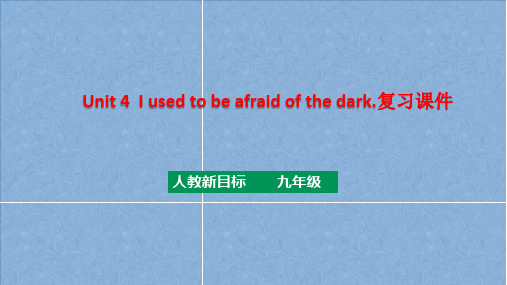九年级下册英语(人教版)专题复习四 时态ppt精品课件
合集下载
人教版英语九年级全册Unit4复习课件

不,我上班了。/是的,我没上班。
2. What’s he like now? 他现在什么样子? What +be +主语+like? 用来询问某人的外 貌特征,意为“…长什么样?”,相当于what do /does +主语+like? ►---What’s your brother like?=What does your brother like? 你哥哥张什么样? 辨析:be like 和look like be like: “像…一样”,常指品德、相貌等相像 ,
= I don’t know what they do with the problem.
2) 动词不定式短语 to deal with 后必须带宾语。 ► I don’t know how to deal with it.
我不知道如何处理这件事。
(3)shyness 名词,意为“害羞;腼腆”是形 容词shy 加后缀-ness 构成的名词。 ► He can’t get over his shyness. 拓展:sad -------- sadness
in the front of :“在…… 的前部”,强调在某一 物体内部的前面
(3)whole 形容词,意为“整个的;全部的”,常 用结构为“the+whole+单数名词”。all也有 此意,但语序不同:all用于冠词、所有格 或其他限定词之前;whole用于冠词、所有 格及其他限定词之后。
all the time
Grammar Focus
I used to be short
I didn’t use to be popular in school.
Paula used to be really quiet.
2. What’s he like now? 他现在什么样子? What +be +主语+like? 用来询问某人的外 貌特征,意为“…长什么样?”,相当于what do /does +主语+like? ►---What’s your brother like?=What does your brother like? 你哥哥张什么样? 辨析:be like 和look like be like: “像…一样”,常指品德、相貌等相像 ,
= I don’t know what they do with the problem.
2) 动词不定式短语 to deal with 后必须带宾语。 ► I don’t know how to deal with it.
我不知道如何处理这件事。
(3)shyness 名词,意为“害羞;腼腆”是形 容词shy 加后缀-ness 构成的名词。 ► He can’t get over his shyness. 拓展:sad -------- sadness
in the front of :“在…… 的前部”,强调在某一 物体内部的前面
(3)whole 形容词,意为“整个的;全部的”,常 用结构为“the+whole+单数名词”。all也有 此意,但语序不同:all用于冠词、所有格 或其他限定词之前;whole用于冠词、所有 格及其他限定词之后。
all the time
Grammar Focus
I used to be short
I didn’t use to be popular in school.
Paula used to be really quiet.
时态复习公开课课件_初中英语中考时态复习课件(绝对精品).ppt

is comes is drawing moved didn’t have
used has studies will visit
Composition: I
Write an article about yourself, tell us your past、your present and your future.(你的过去、现在和将来)
clothes every day.
2.Sometimes he __p_l_a_y__s_ (play)
basketball over there.
3.How often d_o__e_s Sally _s_i_n_g__(sing)?
专项练习
• 1 I can take Li Ming there when he _____ ( come) to visit.
• 其时间状语为often(经常)、 usually(通常)、
always(总是)、 sometimes(有时)等频率副词, on Saturdays(在星期六)、 in the morning(afternoon evening)(在早上(下午 晚 上)) 、every day(每天) 等。
1.The twins ___w__a_s_h____(wash) the
1.The twins ___w_a__sh__e_d__(wash) the
clothes yesterday.
2.The day before yesterday he
_p_l_a_y_e__d_ (play) basketball over there. 3._D_i_d__ Sally _s_i_n_g__(sing) two hours
重读闭音节以一个 辅音字母结尾的, 双写这一字母+ing
中考复习-动词时态 初中九年级英语教学PPT课件 人教版

A. came
B. is coming
C. was coming es
1.发生时间 2.时态结构
未来,还没发生的事
主语+will+动词原形+其他
将要做某事
主语+be(am/is/are) going to+动词原形+其他 打算做某事,根据现象进行推断
3.时态标志 1.tomorrow,next...,in the future,in +时间段
3.两个动作同时发生 长动作:过去进行时 短动作:一般过去时 when-- 长/短 while--长
两个长动作用while
1.当老师进门时我们在说话。 2.当我们在说话时老师进门了。 3.当我们在说话时,小明在写作业。
When the teacher came in ,we were talking.
2.There be 句型: There is/are oing to be There will be
打死不能改
3.主将从现
1.He has gone to Paris.He ______back in three days. A.will come es C. has come D.came
2. There ______ a heavy rain in Beijing tomorrow.
A. is
B. will be
C. is going to have D.will have
3.When he _____here,I________ you.
A. will come, will tell B. comes, tell
camping on the Fenghuang mountain.
新人教版九年级英语《时态 语态》复习公开课课件

had + 过去分词 • 助动词:have及其变形
• 时态的判定通常根据时间状语; • now; every day; usually; often; always; • Just now; ago; last …; yesterday; • By far; so far; recently; already; since; for;
• 难点是一般过去时和现在完成时的区别。
点动词 Vs 延续性动词
• 英文中有些动词只能表示瞬间发生的动作(buy, borrow, happen, etc)另外一些则可以表示动作 延续一段时间(have, keep, live, etc) I bought this new bike last month. So I have had it for a month.
•
C. for two weeks
D. before two weeks
• 17. My brother _____ the Youth League since 1990.
•
A. joined
B. has been in
•
C. has joined
D. had joined
• 18. —Where is Peter?
2. He borrowed the book from me. He has kept it since last year.
• 4. I _____ as soon as you come back.
• A. went
B. have gone
• C. am going
D. shall go
• 5. The scientist _____ Canada and he will give us a talk when he _____ back.
• 时态的判定通常根据时间状语; • now; every day; usually; often; always; • Just now; ago; last …; yesterday; • By far; so far; recently; already; since; for;
• 难点是一般过去时和现在完成时的区别。
点动词 Vs 延续性动词
• 英文中有些动词只能表示瞬间发生的动作(buy, borrow, happen, etc)另外一些则可以表示动作 延续一段时间(have, keep, live, etc) I bought this new bike last month. So I have had it for a month.
•
C. for two weeks
D. before two weeks
• 17. My brother _____ the Youth League since 1990.
•
A. joined
B. has been in
•
C. has joined
D. had joined
• 18. —Where is Peter?
2. He borrowed the book from me. He has kept it since last year.
• 4. I _____ as soon as you come back.
• A. went
B. have gone
• C. am going
D. shall go
• 5. The scientist _____ Canada and he will give us a talk when he _____ back.
人教版英语九年级(全一册)期末专项复习:时态 、 语态 课件(共61张PPT)

(3)现在分词的变化规则:
种类 一般情况 以不发音的e结尾
以重读闭音节结尾, 末尾只有一个辅字母
特殊
构成方法 直接加-ing 去e加-ing
先双写该辅音字母, 再加-ing
特殊记忆
例词
play — playing make — m___a_k_in__g_ run — _r_u_n__n_in__g__ stop — stopping get — getting
● 表示从过去某一时刻开始一直持续到现在的动作或状态。 常与“since+时间点”,“for+时间段”等时间状语连用。 如: We _h__a_v_e__p_la__n_t_e_d_ thousands of trees since 2000. 自从2000年开始,我们已经种了成千上万棵树了。 He __h__a_s_l_e_a_r_n_e_d_ English for three years. 他学英语三年了。
●表示所属关系的动词及短语。如: The car belongs to Mr Wang. 那辆车属于王先生。 ●连系动词,如feel, sound, taste, smell等。如: That sounds like a good idea. 那听起来是个好主意。
课堂作业
03
Ⅰ. 单项选择
1.We have no more vegetables in the
● 表示“主观意愿、打算”用be going to;根据迹象推测 也用be going to。如: He is ___g_o_i_n_g__t_olearn English next term. 他打算下学期学英语。 Look at the black clouds! It’s going to rain. 看那些乌云!马上要下雨了。
人教版九年级英语下册第四单元Unit4 Section A Grammar Focus-4c教学课件

4. 她以前不喜欢小测验。
She __d_id_n_’_t _u_s_e _t_o_ like tests.
新课讲解
5. 你以前很矮, 不是吗? You used to be short, _d_i_d_n_’t_ _y_o_u_? 是的, 我是。/ 不, 不是。 Yes, I __d_id__. / No, Id_id__n_’t___.
新课讲解 否定句式
used当作实义动词
A) 主语+did not used to +动词原形…… He did not use to swim in this river, but he
swims here now. B) 主语+ used not to +动词原形……
used当作情态动词 used not 可以缩写成 usedn’t
Unit 4 I used to be afraid of the dark.
Section A Grammar Focus-4c
目 录
CONTENTS
1 学习目标 3 新课讲解 5 课堂小结 7
2 新课导入 4 当堂小练 6 课后作业
学习目标
Curriculum words: background,interview,Asian,dare, ton,private,guard,require,European, African,British,speech,public
新课讲解
3. Paul _u_s_e_d_t_o_h__a_v_e_l_u_n_c_h_ (以前常常吃午饭) in the restaurant, but now hege_t_s_u_s_e_d__to__h_a_v_i_n_g_l_u_n_c_h___ (习惯吃午饭) at home.
英语人教版九年级全册初中时态

Thank you!
②be about to do 结构表示客观、马上就要发生的事,一般不与具体的时间 状语连用。
③be going to 结构表示必然或很可能发生的事情;be to do结构表示按职责、 义务和要求必须去做或即将发生的动作。
4.现在进行时
(1)概念:表示现在或现阶段正在发生或持续的动作。
(2)构成形式:am/is/are+动词的-ing 形式。 (3)与现在进行时连用的时间状语及提示语有:now,these days, right now, at present, at this moment, Look!, Listen!等。
(9)there be结构的一般将来时为there will be/there is going to be。
(10)will/shall, be about to do 与 be going to 的区别。
①一般将来时的基本结构为“will/shall+动词原形”,表示一个将要发生的动 作或状态。
1.一般现在时
概念:(1)表示经常性、习惯性的动作;
(2)表示现在的情况或状态;
(3)表示客观事实和普遍真理
构成形式:am/is/are或实义动词的原形(主语 是第三人称单数时,动词要用第三人称单数 形式)。
时间状语:always,often,usually, sometimes,once a week,every day等。
①表示有礼貌地询问对方是否愿意或表示客气的邀请或命令时。
②表示意愿时。
③表单纯性的将来,与人的主观愿望和判断无关时。 The sun will set at 7:30 this afternoon. 太阳会在下午7:30落下。
(7)当主句为一般将来时态时,在if,as soon as,until, when等引导的 状语从句中用一般现在时代替一般将来时。 (8)位移词的进行时表将来。
英语人教版九年级全册课件ppt

CD
He was the only little kid at the picnic.
She always listens to pop music. He loves rabbits.
从使用情况来看,闭胸式的使用比较 广泛。 敞开式 盾构之 中有挤 压式盾 构、全 部敞开 式盾构 ,但在 近些年 的城市 地下工 程施工 中已很 少使用 ,在此 不再说 明。
could 和 might
can’t
表示不太有把握 The pen could /
的推测,意为 might be Joe’s. I saw
“可能”。
it on his desk just
now.
表示很有把握的 The girl here can’t be
否定推测,意为 Helen. Helen has “不可能”。 gone to Beijing.
Things in the schoolbag
1. T-shirt 2. hair band 3. tennis balls
从使用情况来看,闭胸式的使用比较 广泛。 敞开式 盾构之 中有挤 压式盾 构、全 部敞开 式盾构 ,但在 近些年 的城市 地下工 程施工 中已很 少使用 ,在此 不再说 明。
从使用情况来看,闭胸式的使用比较 广泛。 敞开式 盾构之 中有挤 压式盾 构、全 部敞开 式盾构 ,但在 近些年 的城市 地下工 程施工 中已很 少使用 ,在此 不再说 明。
2a
Bob and Anna found a schoolbag at the park. Listen and write down the things in the schoolbag.
Linda. 5. It _m_u__st_ be Linda’s schoolbag.
- 1、下载文档前请自行甄别文档内容的完整性,平台不提供额外的编辑、内容补充、找答案等附加服务。
- 2、"仅部分预览"的文档,不可在线预览部分如存在完整性等问题,可反馈申请退款(可完整预览的文档不适用该条件!)。
- 3、如文档侵犯您的权益,请联系客服反馈,我们会尽快为您处理(人工客服工作时间:9:00-18:30)。
九年级下册英语(人教版)
专题复习四 时态
一、单项选择。
( A)1.The earth is a planet and it ________ around the sun.(2017,天津) A.goes B.go C.will go D.went ( A)2.—Paul,I'm busy cooking.Can you give me a hand? —Just a minute.I ________ my e-mail.(2017,河南) A.am checking B.will check C.have checked D.was checking
( C )3.Some exchange students__________with their host families this time
yesterday.(2017,上海) A.are chatting B.will chat
C.were chatting D.have chatted ( B)4.Shared bikes,which are environmentally friendly,________ quite popular among big cities in China since last April.(2017,长沙) A.became B.have become C.will become
( D )9.I ________ football quite well,but I haven't had time to play since the new year.(2017,武汉) A.will play B.have play C.played D.play
( D )10.—Do you know her well?(2017,呼和浩特)
C.will appear D.were appearing
( D )16.I think it is true that Jill ________ to work today because she is on
a trip.(2016,沈阳) A.has come B.didn't come C.is coming D.will not come
( A )12.—How do you usually go to school? —I ________ to school on foot.(2017,北京) A.go B.went C.was going D.wi________ the book in the lab.(2016,河北) A.leave B.left C.will leave D.was leaving ( A )14.Everyone wants to reach the top of the mountain,but all the happiness happens while you ________ it.(2016,河南) A.climb B.climbed
—Sure.We ________ friends since ten years ago.
A.were B.became
C.have become D.have been
( D )11.—You have a nice car.(2017,扬州)
—Thank you.I ______ it for less than one month. A.bought B.have bought C.had D.have had
( D )5.Wow!You ________ dinner!Let's eat now.(2017,河北)
A.cook B.are cooking C.will cook D.have cooked ( D 潍坊) A.makes B.made C.have made D.will make )6.A little effort every day,you ________ a big difference.(2017,
C.are climbing D.have climbed
( C )15.With the development of science and technology,robot cooks ________ in our families in the future.(2016,广东)
A.appear B.appeared
years old. A.will be B.was
C.have been D.would be
( A )19.—Ben and Sue aren't home,are they? —No.They ________ to London on business. A.have gone B.go C.have been D.will go
( A )7.—Look!Your teacher Miss White is over there.
—No,it can't be her.She ________ to Beijing.(2017,南充)
A.has gone B.has been C.went D.will go
( C )8.His grandmother ________ for 6 years.And he still misses her very much.(2017,西宁) A.died B.has died C.has been dead D.has been died
( C)17.This medicine ________ millions of people's lives since it was put into use.(2016,上海)
A.is saving B.will save
C.has saved D.had saved
( C )18.I ________ scared of dogs ever since a dog hurt me when I was five
专题复习四 时态
一、单项选择。
( A)1.The earth is a planet and it ________ around the sun.(2017,天津) A.goes B.go C.will go D.went ( A)2.—Paul,I'm busy cooking.Can you give me a hand? —Just a minute.I ________ my e-mail.(2017,河南) A.am checking B.will check C.have checked D.was checking
( C )3.Some exchange students__________with their host families this time
yesterday.(2017,上海) A.are chatting B.will chat
C.were chatting D.have chatted ( B)4.Shared bikes,which are environmentally friendly,________ quite popular among big cities in China since last April.(2017,长沙) A.became B.have become C.will become
( D )9.I ________ football quite well,but I haven't had time to play since the new year.(2017,武汉) A.will play B.have play C.played D.play
( D )10.—Do you know her well?(2017,呼和浩特)
C.will appear D.were appearing
( D )16.I think it is true that Jill ________ to work today because she is on
a trip.(2016,沈阳) A.has come B.didn't come C.is coming D.will not come
( A )12.—How do you usually go to school? —I ________ to school on foot.(2017,北京) A.go B.went C.was going D.wi________ the book in the lab.(2016,河北) A.leave B.left C.will leave D.was leaving ( A )14.Everyone wants to reach the top of the mountain,but all the happiness happens while you ________ it.(2016,河南) A.climb B.climbed
—Sure.We ________ friends since ten years ago.
A.were B.became
C.have become D.have been
( D )11.—You have a nice car.(2017,扬州)
—Thank you.I ______ it for less than one month. A.bought B.have bought C.had D.have had
( D )5.Wow!You ________ dinner!Let's eat now.(2017,河北)
A.cook B.are cooking C.will cook D.have cooked ( D 潍坊) A.makes B.made C.have made D.will make )6.A little effort every day,you ________ a big difference.(2017,
C.are climbing D.have climbed
( C )15.With the development of science and technology,robot cooks ________ in our families in the future.(2016,广东)
A.appear B.appeared
years old. A.will be B.was
C.have been D.would be
( A )19.—Ben and Sue aren't home,are they? —No.They ________ to London on business. A.have gone B.go C.have been D.will go
( A )7.—Look!Your teacher Miss White is over there.
—No,it can't be her.She ________ to Beijing.(2017,南充)
A.has gone B.has been C.went D.will go
( C )8.His grandmother ________ for 6 years.And he still misses her very much.(2017,西宁) A.died B.has died C.has been dead D.has been died
( C)17.This medicine ________ millions of people's lives since it was put into use.(2016,上海)
A.is saving B.will save
C.has saved D.had saved
( C )18.I ________ scared of dogs ever since a dog hurt me when I was five
